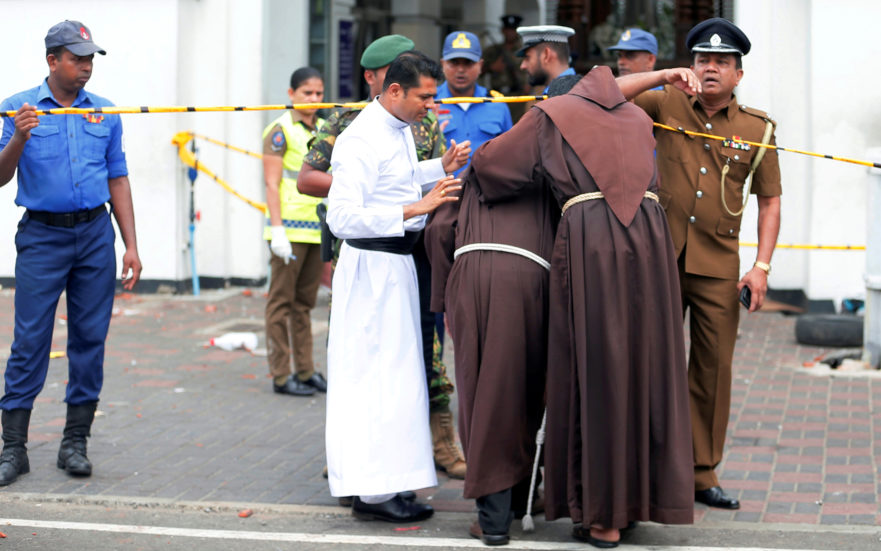Around 8:30am on Easter Sunday in Sri Lanka, Father Kumaran, pastor of the evangelical Zion Church in Batticaloa, spotted a casually dressed stranger carrying a bag standing on the steps of the packed church. The pastor spoke to the man and learned he was a Muslim who said he wanted to attend the service. Another man then questioned the stranger and pushed him outside the church door. At 8:45am the stranger blew himself up and the blast killed twenty-eight and injured others. This was one of eight coordinated attacks on Easter Sunday in Sri Lanka by suicide bombers. They struck three churches, three hotels, a zoo and a house in the suburbs, killing 359 people and injuring 500 others.
It was learned today that ISIS has claimed responsibility for the attacks in coordination with National Thowheeth Jama’ath (NTJ), a small Islamist group of young terrorists in Sri Lanka. A detailed advance warning was provided on April 11th by a foreign intelligence agency stating that NTJ was planning attacks on churches and the Indian High Commission. The attack is considered an intelligence failure because the warning went unheeded.
Up until now, NTJ, the group that formed a few years ago in eastern Sri Lanka, was considered to be primarily anti-Buddhist and they were mainly known for vandalizing Buddhist statues. Some global terrorism experts believe NTJ is now driven by and sustained from a group outside Sri Lanka. Kabir Taneja, a counterterrorism expert at the Observer Research Foundation, a public policy research group in New Delhi and Mumbai, says “The group of mostly young people with deep roots in the community (NTJ) have no strong leaders and little hierarchy or structure. This makes them similar to other places in the Muslim world where the Islamic State has tried to form affiliations.”
The bombings bring to mind the high-profile terror attacks and devastation of Sri Lanka’s civil war from 1983 to 2009. Among the tens of thousands who died, suicide bombers killed Prime Minister Rajiv Gandhi and Sri Lanka’s President. This was followed by the assassination of the Foreign Minister in 2005. The civil war wasn’t fought along clear ethnic lines. Tamil Hindu militant fighters and separatists were seeking independence from the majority Sinhalese Buddhist government. Muslims and Christians were minority groups and they were recruited to both sides. Even though the war ended a decade ago, the government is accused of committing war crimes and other human rights abuses. The UN has not yet been allowed to investigate the atrocities.
Sri Lanka has a population of around 22 million with 70% who identify as Buddhist, 13% are Hindu, 10% are Muslim, and 8% are Christian. Since the war ended in 2009, the underlying causes of the war have not been addressed. The Sinhalese (Buddhists) and Tamils (Hindus) continue to focus on each other and have neglected the needs of Muslims and Christians; both minority groups are marginalized.
While there has been violence against Muslims and Christians in Sri Lanka, most of it until now has been committed by Buddhists. The Evangelical Alliance of Sri Lanka, a group representing 200 churches and other Christian organizations, reports 86 verified incidents of discrimination, threats and violence in 2018 and 26 recorded incidents in the first three months of 2019.
The 2018 U.S. State Department Sri Lanka Human Rights Report notes that some Christian groups and churches in Sri Lanka had been pressured by the government to end worship activities after authorities classified them as “unauthorized gatherings.”
Anne Speckhard, Director of the International Center for the Study of Violent Extremism, told the New York Times , “These attacks appear to be quite different,” she said, “they look as if they came right out of the ISIS, Al Qaeda, global militant jihadist playbook, as these are attacks fomenting religious hatred by attacking multiple churches on a high religious holiday.”
Take Action
1. Pray for Sri Lanka today on the declared National Day of Mourning
2. Read the Open Doors 2018 World Watch List report on Sri Lanka
3. Read Being a Christian in Sri Lanka: Historical, Political, Social, and Religious Consideration
Photo credit: REUTERS/Dinuka Liyanawatte

